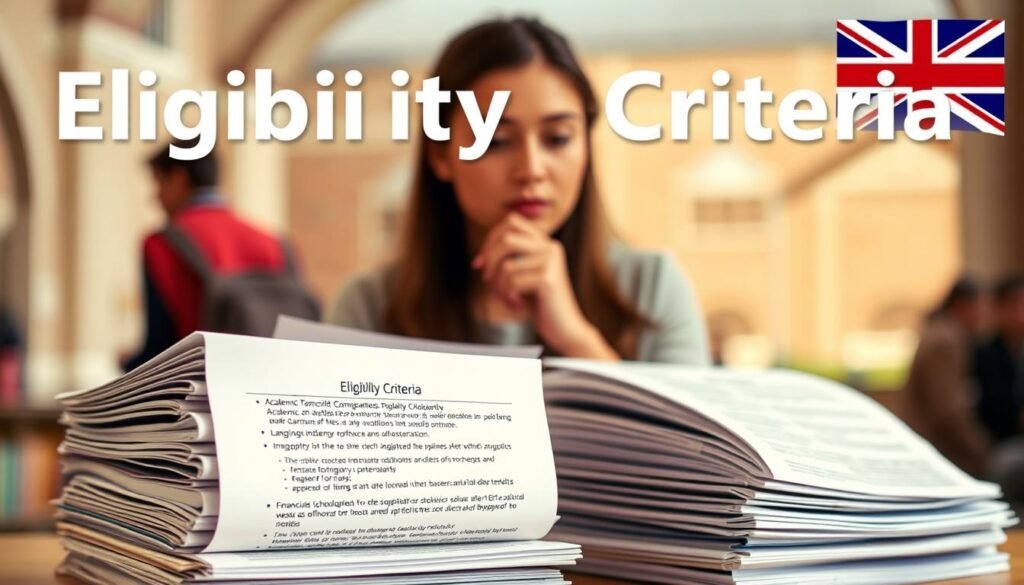
Guide to How to Apply International Scholarships in the UK

Picture this: you arrive in a historic city for your studies with a suitcase and a head full of plans. A short email confirms a fee reduction and a mentoring place, and suddenly the trip feels less daunting. That early support changed one student's path and freed them to focus on research and campus life.
You will find clear steps here to spot awards that match your course and timeline. This section explains how scholarships cut tuition and living costs, and which providers commonly offer support. It also points you to merit-based awards and university schemes so you can act in the current academic year.
We’ll help you check eligibility criteria and prepare an application that stands out. Expect practical advice on deadlines, combining funding with part-time work, and where to look for the biggest impact. For a helpful list of merit-based awards, see this page on merit-based awards.
Learn how to find, apply for, and win top scholarships for 2025–2026 across the US, UK, Canada, and Australia.
Explore Scholarships Guide →- Why the UK and scholarships matter for your studies right now
- apply international scholarships guide UK: the essentials you need to know
- Check your eligibility and requirements before you start
- Step-by-step: how you’ll craft a winning scholarship application
- Map your timeline for the current academic year
- Shortlist opportunities that match your profile
- Gather documents: transcripts, references and proof of funds
- Write a persuasive personal statement and cover letter
- Tailor each application and polish for submission
- Prepare for interviews and follow-up requests
- Key UK scholarships to consider as an international student
- University-specific funding in practice: Coventry University examples
- Other ways to fund your degree alongside scholarships
- Avoid these common mistakes and move forward with confidence
Why the UK and scholarships matter for your studies right now
Studying in Britain gives you access to world-class institutions and strong links with employers. Top names such as the University of Oxford and the University of Cambridge sit alongside many high-ranked departments. You’ll find a wide range of degree programmes that suit different goals.

Scholarships can directly reduce tuition fees and living costs, offering vital financial support so you can focus on learning. Many awards cover tuition or give stipends, making world-class research and teaching more affordable for students.
The UK’s strong research culture connects study to industry. That link boosts your employability and gives practical experience through internships and mentoring. As an international student you can often work part-time while studying, which helps with budgeting.
- You join a diverse community of international students and build networks useful in your home country and beyond.
- Some scholarship packages include events, leadership training and alumni support that continue after graduation.
A clear plan helps you navigate the wide range of awards and target the high-impact options that match your degree and goals.
apply international scholarships guide UK: the essentials you need to know
You’ll want to map what different awards cover before you spend time on an application. Start by grouping awards into full, partial and research-focused types. Full awards such as Chevening and Gates Cambridge can cover tuition, living costs and travel. University funds like Clarendon or UCL Global Undergraduate often include full or partial fees plus stipends.
Know what a scholarship really pays for. Some provide travel or research budgets. Others offer only fee waivers. That difference changes how much you must budget and whether the award meets your needs.

Competition and deadlines shape your timeline. High-value awards attract many students and require early references, tests and crisp evidence of leadership or community impact. Check eligibility criteria and requirements carefully so you don’t waste time on poor-fit options.
- Compare full awards, partial fee waivers and grants to see real value.
- Match merit scholarship versus need-based funding to your strengths.
- Factor in renewal rules, field priorities and post-award engagement expectations.
Finally, balance ambition with realism by shortlisting awards that fit your undergraduate or postgraduate aims. For broader funding ideas and comparison, see this summary on scholarships for international students.
Check your eligibility and requirements before you start
A quick eligibility check will save you hours and focus your energy on suitable opportunities. Begin by listing the basic criteria each funder asks for: GPA thresholds, permitted courses and any institutional requirements. This helps you avoid time on options that do not fit.

Academic excellence matters. Many awards favour strong grades and a clear course fit in STEM, health or development. Confirm whether the scholarship targets merit, need or a mix, and plan how you will evidence each point.
Country rules vary. Some funds limit applicants to citizens of particular regions or Commonwealth nations. Check any clause about returning to your home country after study and factor that into your goals statement.
- Verify English proficiency, visa timelines and residency conditions early.
- Prepare leadership evidence with numbers and referees who can confirm impact.
- Check whether tuition and fees are covered fully, partially, or if stacking awards is restricted.
For specific opportunities and fully funded undergraduate comparisons, see the Moldova Fulbright visiting programme and a useful list of fully funded undergraduate awards. Also review targeted visiting fellow calls at Moldova Fulbright for format examples.
Step-by-step: how you’ll craft a winning scholarship application
A tight timeline is your strongest ally when preparing a competitive scholarship application. Start by mapping the academic year backwards and set fixed dates for tests, referees and drafts.
Map your timeline for the current academic year
Create internal deadlines for each stage: tests, personal statements, and reference requests. Treat these milestones as non-negotiable so you avoid last-minute rushes.
Shortlist opportunities that match your profile
Prioritise awards that fit your degree, strengths and mission. Focus on a realistic mix of high-impact and reachable options to make best use of your time.
Gather documents: transcripts, references and proof of funds
Obtain official transcripts and certified translations early. Brief referees with key achievements and draft points to help their letters back your case.
Write a persuasive personal statement and cover letter
Show impact. Use numbers and clear examples of leadership and community work. Tailor each statement to the funder’s aims rather than using generic claims.
Tailor each application and polish for submission
Check word counts, file names and formatting. Confirm every file opens and follows the funder’s rules to pass initial checks.
Prepare for interviews and follow-up requests
"Practice concise answers that show outcomes and learning not just intentions."
Plan evidence folders and rehearse short, outcome-focused replies. Track submissions and confirm receipt. If you’re re applying next cycle, keep notes to strengthen future attempts.
Want a step-by-step application walkthrough? See this step-by-step application walkthrough for a clear checklist and templates you can adapt.
Key UK scholarships to consider as an international student
Highlighting flagship awards helps you match funding to your research or course ambitions. Below are the major schemes you should weigh when planning study and finances.
Chevening Scholarships for master’s candidates
Chevening funds one-year master’s degrees, covering tuition, a living allowance and travel. Recipients are expected to return to their home country and show leadership potential.
Commonwealth scholarships target citizens of Commonwealth nations and commonly cover tuition fees, stipends and flights. They emphasise development impact for applicants from eligible countries.
Gates Cambridge Scholarships
Gates Cambridge supports full-time postgraduate study at Cambridge and meets full costs for outstanding researchers. It suits bold research plans and interdisciplinary work.
Rhodes Scholarships and Clarendon Fund
Rhodes at Oxford rewards academic excellence and leadership for postgraduate study. Clarendon offers a broad merit scholarship, covering tuition and a living grant across many disciplines.
University-led and research-focused awards
University options include UCL Global Undergraduate awards for students with financial need and Imperial’s President’s PhD Scholarships for top doctoral candidates.
Research routes such as Edinburgh Global Research Scholarships and Warwick’s Chancellor’s International Scholarship target high-potential PhD applicants and often cover tuition and living costs.
- What to note: many great scholarships can cover tuition, fees and travel.
- Selection themes focus on leadership, academic excellence and societal impact.
- Deadlines, referees and documentation differ by funder—match each award to your profile.
University-specific funding in practice: Coventry University examples
Coventry University’s funding examples show how clear figures and timelines can change your budgeting for study.
Below are the main offers you should consider if you plan to study at Coventry or Coventry University London. Each item lists the amount, intake windows and what is excluded.
Vice-Chancellor Undergraduate Scholarship
Save up to £4,000 off a three-year bachelor’s tuition fee for January 2026 starters. This offer is available to Coventry and Coventry London international students, but it excludes EU nationals, International Pathways and fully online courses.
Vice-Chancellor Postgraduate Scholarship
Save £2,500 on course tuition for starts in November 2025, January 2026 and March 2026. The same campus availability and exclusions apply as for the undergraduate award.
EU Support Bursary, Alumni Discount and Sports Scholarships
The EU Support Bursary reduces tuition fees to the UK rate automatically for eligible EU learners across intakes through 2026-27 for undergraduate and taught postgraduate courses.
The 2025–26 Alumni Discount gives 25% off postgraduate tuition to Coventry graduates across campuses and disciplines.
Sports Scholarships for September 2025 offer £1,500 or £3,000 in combined cash and support. Around 40–45 awards are available annually for BUCS, Olympic or Paralympic athletes.
"All awards are subject to availability, visa requirements and specific criteria."
| Offer | Amount | Eligible intakes | Exclusions / Notes |
|---|---|---|---|
| Vice-Chancellor Undergraduate | Up to £4,000 | January 2026 | Excludes EU students, International Pathways, 100% online |
| Vice-Chancellor Postgraduate | £2,500 | Nov 2025, Jan 2026, Mar 2026 | Same exclusions as undergraduate |
| EU Support Bursary | Tuition adjusted to UK rate | 2024-25, 2025-26, 2026-27 intakes | Applies to eligible EU starters on UG and taught PG courses |
| Alumni & Sports | 25% off PG / £1,500–£3,000 | 2025–26 (Alumni) / Sep 2025 (Sports) | Alumni: any discipline; Sports: BUCS/Olympic/Paralympic evidence required |
- Check visa status and eligibility before you plan documents.
- Match your chosen courses to each scheme since delivery mode can rule you out.
- Compare these offers with other institutions to decide which funding package suits you best.
Other ways to fund your degree alongside scholarships
Discover alternative sources of support that can fill gaps left by awards and help you finish your degree.
Private student loans: These can cover tuition and living costs, but check interest rates and repayment terms. Borrow only what you need and model post-graduation payments so your long-term budget stays realistic.
Grants and fellowships
Grants and fellowships fund research, travel or fieldwork and often target specific fields. Write a concise proposal and budget to show how funds will cover tuition, travel and materials. External fellowships are available international options for many disciplines.
Teaching and research assistantships
Assistantships can reduce fees and provide a stipend while you gain academic experience. These positions also strengthen your CV for postgraduate roles and further funding applications.
Part-time work
Most visa rules allow up to 20 hours per week in term and full-time in holidays. Budget realistically for rent, transport and food so work complements rather than hinders study.
- Stack support carefully: confirm whether awards allow combining loans, bursaries and paid roles.
- Time your applications so alternative funding cycles align with your main application deadlines.
- For more on combining funding and high-value awards see this page on fully funded graduate scholarships.
Avoid these common mistakes and move forward with confidence
A clear checklist removes guesswork and keeps your submission competitive.
Start by avoiding common slips: missed deadlines, incomplete files and low-fit applications. Check eligibility criteria early so you do not waste time on awards with nationality or field limits, such as some Commonwealth schemes.
Tailor every essay; generic text won’t stand out to selectors. Use numbers and outcomes to show real impact from projects, leadership or work linked to your degree and goals.
Confirm what each award will cover tuition, living costs or other fees and whether you can combine funding. Keep a master calendar for deadlines, references, tests and interviews to stay calm.
Learn, refine and reapply: track feedback, strengthen weak areas and try again next cycle. For more funding comparisons and lists, see this top universities and awards overview.
Looking for Scholarships in 2026?
Explore our complete collection of top scholarships for international students across the USA, UK, Canada, Australia, and Europe.






Leave a Reply